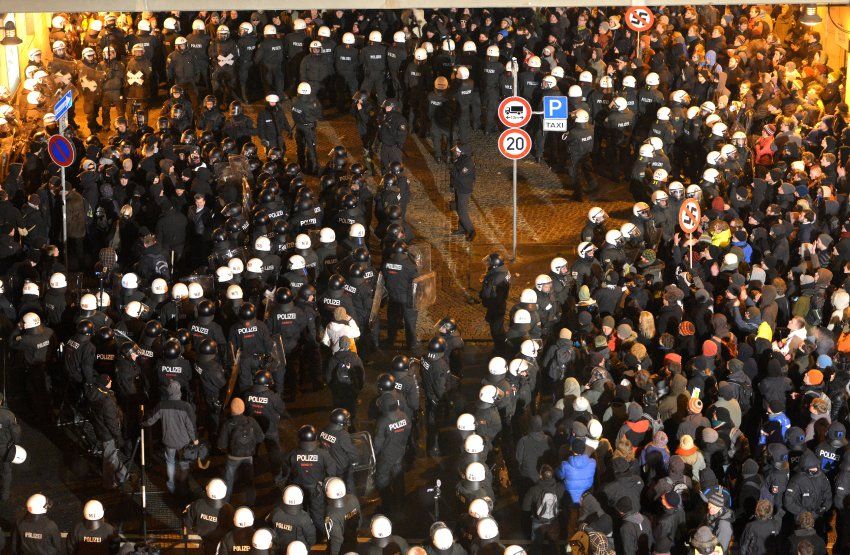Jonah Goldberg: The liberal media doesn’t have any influence
Jonah Goldberg recently wrote an op-ed emphasizing how powerful media influences are (“If speech can inspire good actions, it can inspire bad actions, too“). His point:
Liberals decry the toxic rhetoric of the right, conservatives blame the toxic rhetoric of the left.
When attacked – again heedless of ideology or consistency – the gladiators instantly trade weapons. The finger-pointers of five minutes ago suddenly wax righteous in their indignation that mere expression – rather, their expression – should be blamed. Many of the same liberals who pounded soapboxes into pulp at the very thought of labeling record albums with violent lyrics warnings, instantly insisted that Sarah Palin had Rep. Gabby Giffords’ blood on her hands. Many of the conservatives who spewed hot fire at the suggestion that they had any culpability in an abortion clinic bombing, gleefully insisted that Sen. Bernie Sanders is partially to blame for Rep. Steve Scalise’s fight with death. …
I have always thought it absurd to claim that expression cannot lead people to do bad things, precisely because it is so obvious that expression can lead people to do good things. According to legend, Abraham Lincoln told Harriet Beecher Stowe, “So you’re the little woman who wrote the book that started this great war.” Should we mock Lincoln for saying something ridiculous?
As Irving Kristol once put it, “If you believe that no one was ever corrupted by a book, you have also to believe that no one was ever improved by a book. You have to believe, in other words, that art is morally trivial and that education is morally irrelevant.”
If words don’t matter, then democracy is a joke, because democracy depends entirely on making arguments – not for killing, but for voting. But only a fool would argue that words can move people to vote, but not to kill.
Jonah Goldberg’s op-ed “Leave liberal Hollywood to the liberals” argues that despite the fact that Hollywood is “overwhelmingly, though not uniformly, liberal,” conservatives shouldn’t try to buy up media in order to get their messages out. Buying up media is a waste of time because “Hollywood influence is agonizingly hard to predict or dismiss as unthinkingly liberal.”
This strikes me as head-bangingly wrong, and not the least because the messages put out by Hollywood are quite designedly rather than unthinkingly liberal. A repeated message at TOO is that the world would change rather quickly and dramatically if there was one above-ground, widely available, well-funded, mainstream media outlet — a sensible version, say, of Fox News or MSNBC, but with a perspective supporting the interests of European-Americans and Whites around the world.
But Goldberg’s advice is idiotic even for someone who styles himself a mainstream conservative. The media does have influence and the influence is generally in the direction intended by its creators.
Since I rather doubt that Goldberg is an idiot, I suspect there are some deep motivations going on here—including that Goldberg is not a conservative at all. As Peter Brimelow phrased it, with Goldberg assuming a prominent position at National Review, it had become a “once-conservative, now respected, magazine.”
And yes, I suspect that ultimately it has to do with Goldberg’s Jewish identity. Like other neocons, Goldberg has been an enthusiastic supporter of all of the fundamental positions of the organized Jewish community, including displacement-level non-White immigration and opposition to identity politics for White people (see above link). It’s revealing that Goldberg was not particularly upset by the recent election (“The right isn’t waving a white flag“), claiming that conservatism will come back, as it has before. Not one mention of the demographics of the vote or what that portends for the GOP or what the GOP ought to do about it. Goldberg is quite happy about the ethnic transformation that is making the Republicans, conservatism and indeed White people obsolete.
Goldberg also supported the firing of John Derbyshire from National Review. One wonders why he would care about firing Derbyshire if the media doesn’t have any influence anyway. Why not let Derbyshire continue to have a forum for race realism at National Review? One wonders why the media is so intensively policed to remove voices that conflict with the liberal world view—people like Pat Buchanan, Glenn Beck, Lou Dobbs. Why was Media Matters so upset when CNN quoted Brimelow and TOO’s James Edwards on immigration-related issues? Read more









